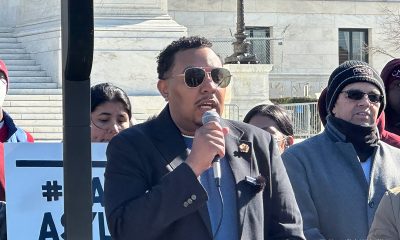News
Gay, bi lawmakers criticized for joining GOP on Obamacare vote
Sinema, Maloney sought to delay individual mandate


Rep. Kyrsten Sinema (D-Ariz.) and Rep. Sean Patrick Maloney are incurring the wrath of gay activists for voting with House Republicans. (Photo of Sinema courtesy the Sinema campaign; Washington Blade photo of Maloney by Michael Key).
Two Democratic members of Congress — one gay and one bisexual — are incurring the wrath of LGBT activists for voting with House Republicans to delay certain portions of Obamacare in exchange for keeping the government in operation.
Reps. Sean Patrick Maloney (D-N.Y.) and Kyrsten Sinema (D-Ariz.) were among nine Democrats on Monday who voted for a Republican-led resolution that provided funds for the government for fiscal year 2014, but included a provision delaying the individual mandate and requiring members of Congress and their staffs to pay the full cost of insurance without the government subsidy.
Additionally, Maloney voted for another measure that includes the above policy items in addition to calling for a conference committee with the Senate, which would likely mean some give on health care reform.
Both Maloney and Sinema also joined Republicans on Sunday to vote for repeal of the tax on medical devices as part of Obamacare.
Each House proposal was rejected by the Senate, which has insisted on a bill that only continues funding for the government, leading to the stalemate that caused the government shutdown on Tuesday.
Michael Rogers, a D.C.-based LGBT rights advocate, said the vote means Sinema and Maloney are Democrats in name only.
“I am a progressive so I wish Sinema and Maloney were more concerned about the American people than with their reelection,” Rogers said. “When Democrats stand for Democratic principles we win. If these two people won as out LGBT people, surely they would not have been tossed out sticking with their caucus. It is sellouts like Sinema and Maloney who, as DINOs, are more than willing to cave in to the crazy demands of the right.”
Michaelangelo Signorile, a gay New York activist and radio host on SiriusXM, took to Twitter to express his indignation.
Gay ConservaDems took $$ from progressives, Sinema and Maloney, voted #shutdown. Make sure they meet fate of Christine Quinn @DenisDison
— Michelangelo Signorile (@MSignorile) October 1, 2013
John Aravosis, who’s gay and editor of AMERICAblog, also had harsh words for the two lawmakers, who ran as openly gay/bi candidates and took donations from the LGBT community.
“I think it’s abominable,” Aravosis said. “No Democrat, let alone a gay or bisexual one, should be working to undercut health care protections for Americans, let alone helping John Boehner do anything.”
The other openly gay lawmakers in the U.S. House — Reps. Jared Polis (D-Colo.), David Cicciline (D-R.I.), Mark Takano (D-Calif.) and Mark Pocan (D-Wis.) — didn’t join Maloney or Sinema in these votes.
Maloney and Sinema voted against the most drastic proposal from House Republicans to attach a one-year delay of health care reform to the spending bill for fiscal year 2014.
In a statement, Maloney defended his vote for delaying the individual mandate by pointing to the administration.
“I strongly support the president’s decision to give employers more time to comply with the law, and I believe that we should give families the same flexibility we’re giving to our small businesses,” Maloney said.
Maloney also explained his support for eliminating health care subsidies for government employees by saying the playing field for public and private workers should be equal.
“Families and businesses in the Hudson Valley are not getting special subsidies from Obamacare and neither should members of Congress or the White House,” Maloney said.
In a separate statement, Sinema defended her votes by saying they ensure individuals can sign up for health care plans without “being punished” for failing to purchase adequate healthcare coverage.
“It’s now been proven that too many states are not ready to implement the marketplaces,” Sinema said. “It’s not fair to punish people who don’t have the information they need to make informed decisions. Arizona’s hard-working families need transparency and certainty about this healthcare law and its implementation. A one-year delay of the individual mandate will ensure that Arizonans get that certainty.”
Sinema also said health care subsidies for government employees shouldn’t happen with a government shutdown in effect.
“Additionally, I supported tonight’s amendment because members of Congress should not ask the government to pay for their healthcare while Americans at home suffer during government shutdown,” Sinema said.
Neither the office of House Minority Leader Nancy Pelosi (D-Calif.) nor the Democratic National Committee responded to the Blade’s request for comment on Sinema and Maloney joining House Republicans. Shin Inouye, a White House spokesperson, is on furlough and unable to respond to media requests.
The Gay & Lesbian Victory Fund, which endorsed the openly gay/bi candidates and called for donations from LGBT people for the candidates, didn’t respond to a request for comment. The Human Rights Campaign also endorsed both candidates and didn’t immediately respond to a request for comment.
Sinema and Maloney have been active on LGBT-specific issues since their election to Congress. They voted for an LGBT-inclusive version of the Violence Against Women Act reauthorization and signed a friend-of-the-court brief urging the U.S. Supreme Court to strike down the Defense of Marriage Act.
Dana Beyer, a Chevy Chase, Md.,-based transgender activist, said the LGBT community shouldn’t judge Sinema and Maloney too harshly for their votes because “these late night political machinations are generally theater” and don’t say anything about the lawmakers’ overall voting records.
“This issue isn’t about the LGBT community; it’s about America,” Beyer said. “They should be judged on a much broader set of criteria and values than this one vote, and I hope people take the context into account.”

The Mexican Senate on Thursday approved a bill that would ban so-called conversion therapy in the country.
Yaaj México, a Mexican LGBTQ rights group, on X noted the measure passed by a 77-4 vote margin with 15 abstentions. The Chamber of Deputies, the lower house of Mexico’s congress, approved the bill last month that, among other things, would subject conversion therapy practitioners to between two and six years in prison and fines.
The Senate on its X account described conversion therapy as “practices that have incentivized the violation of human rights of the LGBTTTIQ+ community.”
“The Senate moved (to) sanction therapies that impede or annul a person’s orientation or gender identity,” it said. “There are aggravating factors when the practices are done to minors, older adults and people with disabilities.”
Mexico City and the states of Oaxaca, Quintana Roo, Jalisco and Sonora are among the Mexican jurisdictions that have banned the discredited practice.
The Senate in 2022 passed a conversion therapy ban bill, but the House of Deputies did not approve it. It is not immediately clear whether President Andrés Manuel López Obrador supports the ban.
Canada, Brazil, Belgium, Germany, France, and New Zealand are among the countries that ban conversion therapy. Virginia, California, and D.C. are among the U.S. jurisdictions that prohibit the practice for minors.
The White House
Four states to ignore new Title IX rules protecting transgender students
Biden administration last Friday released final regulations

BY ERIN REED | Last Friday, the Biden administration released its final Title IX rules, which include protections for LGBTQ students by clarifying that Title IX forbids discrimination based on sexual orientation and gender identity.
The rule change could have a significant impact as it would supersede bathroom bans and other discriminatory policies that have become increasingly common in Republican states within the U.S.
As of Thursday morning, however, officials in at least four states — Oklahoma, Louisiana, Florida, and South Carolina — have directed schools to ignore the regulations, potentially setting up a federal showdown that may ultimately end up in a protracted court battle in the lead-up to the 2024 elections.
Louisiana State Superintendent of Education Cade Brumley was the first to respond, decrying the fact that the new Title IX regulations could block teachers and other students from exercising what has been dubbed by some a “right to bully” transgender students by using their old names and pronouns intentionally.
Asserting that Title IX law does not protect trans and queer students, Brumley states that schools “should not alter policies or procedures at this time.” Critically, several courts have ruled that trans and queer students are protected by Title IX, including the 4th U.S. Circuit Court of Appeals in a recent case in West Virginia.
In South Carolina, Schools Supt. Ellen Weaver wrote in a letter that providing protections for trans and LGBTQ students under Title IX “would rescind 50 years of progress and equality of opportunity by putting girls and women at a disadvantage in the educational arena,” apparently leaving trans kids out of her definition of those who deserve progress and equality of opportunity.
She then directed schools to ignore the new directive while waiting for court challenges. While South Carolina does not have a bathroom ban or statewide “Don’t Say Gay or Trans” law, such bills continue to be proposed in the state.
Responding to the South Carolina letter, Chase Glenn of Alliance For Full Acceptance stated, “While Supt. Weaver may not personally support the rights of LGBTQ+ students, she has the responsibility as the top school leader in our state to ensure that all students have equal rights and protections, and a safe place to learn and be themselves. The flagrant disregard shown for the Title IX rule tells me that our superintendent unfortunately does not have the best interests of all students in mind.”
Florida Education Commissioner Manny Diaz also joined in instructing schools not to implement Title IX regulations. In a letter issued to area schools, Diaz stated that the new Title IX regulations were tantamount to “gaslighting the country into believing that biological sex no longer has any meaning.”
Governor Ron DeSantis approved of the letter and stated that Florida “will not comply.” Florida has notably been the site of some of the most viciously anti-queer and anti-trans legislation in recent history, including a “Don’t Say Gay or Trans” law that was used to force a trans female teacher to go by “Mr.”
State Education Supt. Ryan Walters of Oklahoma was the latest to echo similar sentiments. Walters has recently appointed the right-wing media figure Chaya Raichik of Libs of TikTok to an advisory role “to improve school safety,” and notably, Raichik has posed proudly with papers accusing her of instigating bomb threats with her incendiary posts about LGBTQ people in classrooms.
The Title IX policies have been universally applauded by large LGBTQ rights organizations in the U.S. Lambda Legal, a key figure in fighting anti-LGBTQ legislation nationwide, said that the regulations “clearly cover LGBTQ+ students, as well as survivors and pregnant and parenting students across race and gender identity.” The Human Rights Campaign also praised the rule, stating, “rule will be life-changing for so many LGBTQ+ youth and help ensure LGBTQ+ students can receive the same educational experience as their peers: Going to dances, safely using the restroom, and writing stories that tell the truth about their own lives.”
The rule is slated to go into effect Aug. 1, pending any legal challenges.
****************************************************************************

Erin Reed is a transgender woman (she/her pronouns) and researcher who tracks anti-LGBTQ+ legislation around the world and helps people become better advocates for their queer family, friends, colleagues, and community. Reed also is a social media consultant and public speaker.
******************************************************************************************
The preceding article was first published at Erin In The Morning and is republished with permission.
South America
Argentina government dismisses transgender public sector employees
Country’s Trans Labor Quota Law enacted in 2021

Protests have broken out across Argentina in recent weeks after the dismissal of transgender people from their government jobs.
President Javier Milei’s action is in stark contract with the progress seen in 2023, where the government’s hiring of trans people increased by 900 percent within the framework of the Trans Labor Quota Law that had been in place since 2021.
Among those affected is Sofia Diaz, a “survivor” who shared her testimony with the Washington Blade hours after she traveled from Chaco Province to Buenos Aires to protest her dismissal.
Presentes, an LGBTQ news agency, reported the government dismissed more than 85 trans employees in less than two weeks.
Diaz, 49, holds a degree in combined arts. She joined the National Social Security Administration (ANSES) in 2022 under the Trans Labor Inclusion Law. The layoffs began in January and left many people feeling uncertain and anguished. It was her turn a few days ago.
Diaz in an interview recounted how the situation became progressively more complicated, with difficulties in accessing information about her employment status and the eventual confirmation of dismissals through WhatsApp messages. This government action, according to Diaz, violates the law.
“We were on a Friday, I think on March 24, in the office and we have a WhatsApp group of other colleagues from all over Argentina who entered through the trans labor quota and they tell us if we can get our pay stubs on the intranet,” Diaz recalled. “So, I tried to enter, I could not, I talked to two other colleagues and they told me no, they could not, and so we went to another person. He couldn’t either.”
“Some people told us that it could be a system error. Well, we were never calm, let’s say not how this issue of installing fear and the perversion with which they do it ends,” she added. “This sadism of … inflicting pain and speculating with your misfortune and so on … is something that characterizes Javier Milei’s government.”
Diaz recalled a list of those dismissed from the agency began to circulate from the union in the afternoon. A colleague passed it on to her, “and well, unfortunately I was also on that list.”
“At that moment the whole weekend went by with anguish, crying, and talking with other colleagues from other places, not only trans, but everyone, everyone and everyone,” she said. “On Monday when we went to try to enter, we could not enter with the biometric, which is the thumb we had to use every morning to enter.”
Despite the difficult moment through which she is going, the trans activist stressed to the Blade that she will continue protesting and will even sue the government because her dismissal is illegal and “violates the constitution itself.”
The LGBTQ community and its allies have mobilized and organized demonstrations, highlighting the importance of defending the rights won and fighting against discrimination and exclusion. Diaz emphasized the fight is not only for the people affected today, but also for future generations, saying the historical memory of the struggles for inclusion and social justice must be kept alive.
“The Argentine government thus faces a key challenge in human and labor rights, where public pressure and social mobilization can play a determining role in protecting the rights of LGBTQ+ people,” Diaz said.
-

 State Department3 days ago
State Department3 days agoState Department releases annual human rights report
-

 South America1 day ago
South America1 day agoArgentina government dismisses transgender public sector employees
-

 Maryland5 days ago
Maryland5 days agoJoe Vogel campaign holds ‘Big Gay Canvass Kickoff’
-

 District of Columbia1 day ago
District of Columbia1 day agoCatching up with the asexuals and aromantics of D.C.












